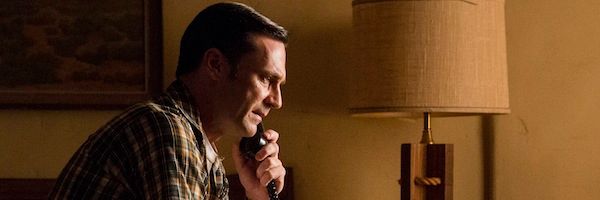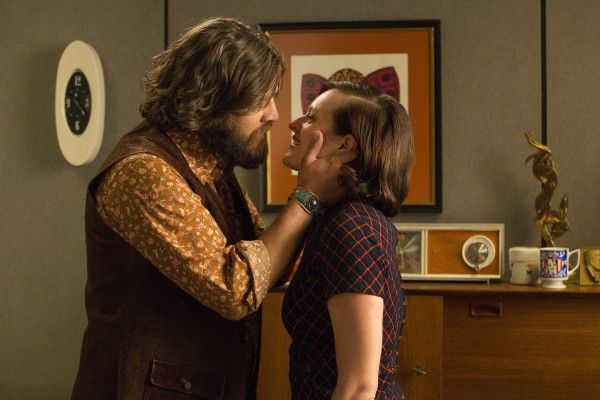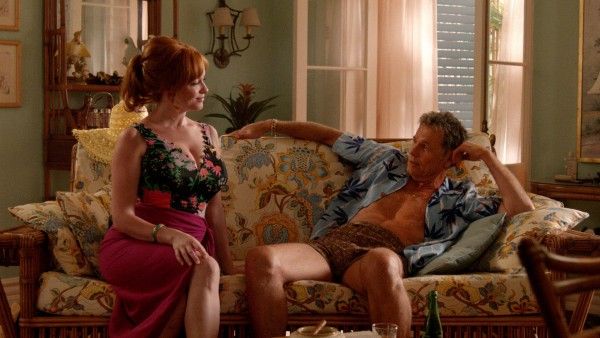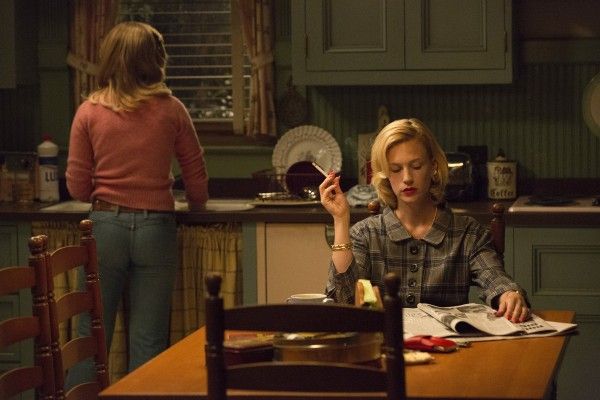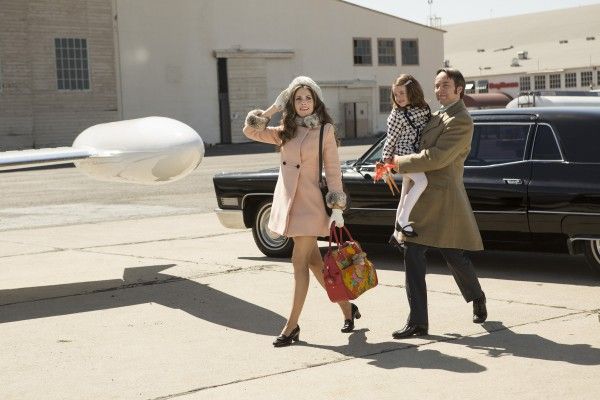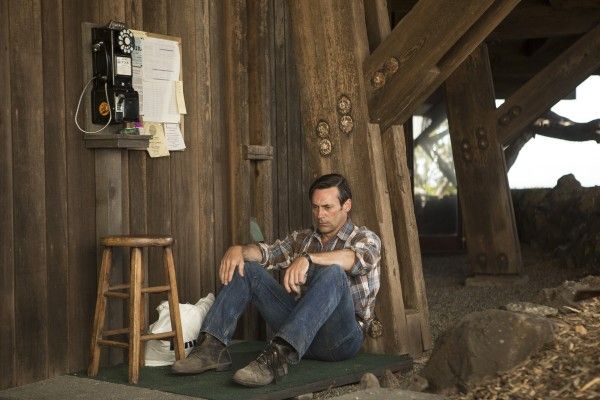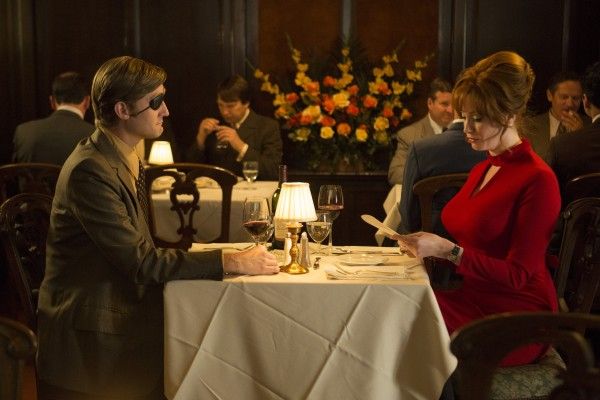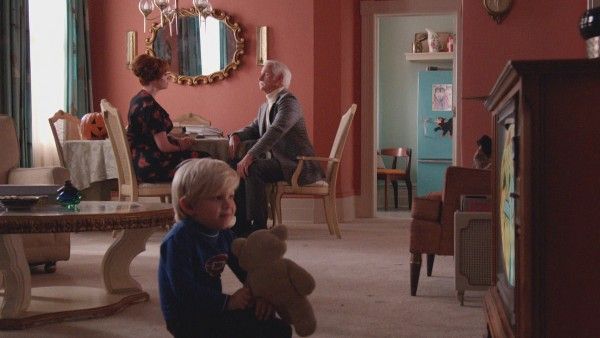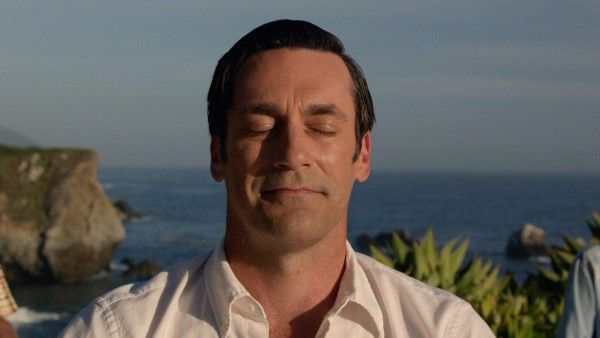The End of Era is truly here. Though I wrote up an initial reaction to Mad Men's series finale "Person to Person" in my episode recap, I wanted to delve into it a little deeper and ask my fellow Mad Men fans here at Collider what they thought. Below, Adam Chitwood, Chris Cabin, Brian Formo and I all weigh in with a roundtable discussion on the final episode, the show's legacy, our favorite characters, and more. We encourage you to add your own thoughts and theories in the comments.
Allison: Mad Men is dead, long live Mad Men! That was a feels-filled finale, and it felt right. I exhausted most of my hot-take reaction in my recap, but I want to know how you guys felt -- Happy? Sad? Disappointed? Frustrated? Other adjectives? Did Don create the Coke ad, or did he stay lost in California? And most importantly: Peggy and Stan!
Chris: Well, let's start at your last point: Peggy and Stan, indeed! For me, it was the sole moment where I felt a sense of culmination; it's the only sequence where I really felt like I was watching a major series' finale. And Matthew Weiner, who wrote and directed the episode on his own, gave their sequence all the bells and whistles that such a moment deserves. Both Elisabeth Moss and Jay R. Ferguson did excellent work here, letting their characters wander to the very evident point in their own shambling way. I'll admit, I grinned like an idiot the entire scene.
The rest of the episode just felt like another season finale and, on the whole, I loved that about "Person to Person." There was no stretch to give Don a true a-ha moment and amend his life, but rather a glimpse at what these lives may become, left solely to our imagination for the time being. Unlike, say, Breaking Bad, I never felt a press to tie-up loose strings or make a definite conclusion for our main character, and the use of the "I'd Like to Buy the World a Coke" ad underlines that crucial ambiguity to me.
I can't say I'm particularly taken with the idea of Don making the Coke commercial, but then, really, who knows? His reaction to Peggy telling him that McCann would take him back signaled a definitive "never again" in my book. That being said, considering Don is, among other things, a corrupted symbol of Weiner's own creative process as a writer and filmmaker, it makes sense that his final moment would be contemplating what's next, much as I'm sure Weiner is wondering right about now. Well, actually, he deserves to sleep in this morning, today of all days.
What did we think of Richard's exit and that last phone call between Betty and Don? I apologize, Birdie and Don.
Brian: Chris, Richard's exit is the perfect segue from the Stan and Peggy coupling!
In the Twitter cave I dwelled in post-viewing, I saw some knee-jerk reactions that Joan's choice to start her own company over settling down in early retirement with Richard made her "more feminist" than Peggy because Peggy turned down the chance to be a partner in Joan's new production company, in order to remain status quo at McCann. Such a takeaway pits the two strongest-willed women on the show as feminist adversaries—which is indeed something that Weiner and the writers have had them struggle with ever since Joan became a partner—but it also is a disservice to the careful longview of the Mad Men writers.
We've come to love Joan and Peggy for their strength and ascension within a very closed-off man's world. But they've both approached it very differently, and they don't have to travel through the same tunnel together simply because they are the take-charge women of the show. In a program where most of the men don't change (indeed that's what makes them "mad"), Peggy and Joan have slowly flipped roles. A few seasons ago, Joan probably would've gladly left her job for the comfy early retirement of beaches and casual making-up-for-lost-time coke snorts with Richard. But that was before she made partner, and then never actually received the respect that a partnership entails. Two episodes ago she was still being asked to sleep for her business (without technically being talked to quid pro quo, as she is at the top), so of course she needs to step out on her own. Men within her agency have never seen her as a peer. It was admirable to see Joan stand her ground that yes, she and Richard could do both—be married and allow her to run her own industrial video production company. Richard was the heel. But don't make Peggy a heel by turning down Joan's partnership offer. Both Peggy and Joan made the correct choices for themselves. Peggy is best at wrangling a certain creative spark that doesn't exist in the industrial video world. Just because she's offered a job doesn't mean she should take it, in the same way that just because Joan is offered a cozy existence doesn't mean she should take it. They're both being true to their actual goals.
Besides, I believe that Peggy got Don back for that Coke ad. And so in the end, Peggy might make partner before 1980 (a prediction that Pete genuinely and sweetly said, knowing that it is unfair). 1980 is indeed too far away for finally getting that sort of Peggy advancement. But I am certain that Peggy and Joan will have a lot of power lunches.
Also, the Coke commercial ending was brilliant: Don was essentially canned for bringing Dick Whitman to a Hershey's meeting because it was too depressing, but he finally figured out how to bring Dick Whitman Life Experiences into advertising in a positive way because he finally allowed himself to feel hope in his identity; and he gave the world hope via a Coke commercial. Perfect.
Okay, so I worked Don into it, Allison what's your takeaway on the Don and Birdie closure?
Allison: I was really happy the show honored what has always been a complicated but palpable connection between Don and Betty (Birdie!) Ever since they met up upstate in "The Better Half" and slept together, their relationship has taken on a new kind of honesty.
I also think that Betty's presence served two purposes in "Person to Person": one, to show how much Sally has grown and matured, and how unselfish she's become (or even been forced to become, but it was still a choice -- she could have taken the Don or Betty route on this, and instead, she came home and helped).
Also, Betty (and Sally) made Don really see the truth about his parenting: he's just not there. He stays in touch with Sally, but when is the last time we genuinely saw him interact with Bobby or Gene? Throughout the back half of this season in particular, Don has been searching desperately to find meaning and a place for himself, running from his ad man life in the hopes of finding something that will give him what he's looking for. In that call with Betty, I think he regrets not only that he essentially walked out on his family and failed them, but that it can't be rectified because it's not in him to rectify it. Don was and is selfishly motivated, and none of that changed. And realistically, it shouldn't.
And Betty smoking a cigarette in the end was really just perfect.
So, Don and Betty couldn't make a second go of it for many reasons, but what about Pete and Trudy? Do any of you guys believe they really made it and were happy in Wichita? But more importantly, can we talk about what a great character Pete Campbell has been from start to finish? You didn't have to like him, but he was never boring (and never easy to just straight hate like Harry Crane).
Adam: I just have to say that, while January Jones/Betty has been polarizing throughout the series' run (mainly because Betty really exists in a show of her own), can we all agree that Jones absolutely brought it these past two episodes? Such incredible performances, and the last phone conversation between Don and Betty (due praise also goes to Hamm for essentially playing all these "goodbye" scenes over the phone) was devastatingly perfect. The Draper Family Unit is a shell of its former self when looking back on the pilot, but in the end there's a hopefulness for their future in the hands of Sally Draper. A Mad Men spinoff is probably a horrible idea, but I have to admit...I would watch the hell out of a "Sally Draper Takes On the 70s and 80s" show.
With regards to Pete and Trudy, I was somewhat taken aback by their reconciliation in the penultimate episode. I'm not sure Pete has the ability to truly be happy--like Don, there were plenty of times when he "had it all" and was simply discontent. And this season kind of brought home the idea that Trudy had given up on finding love, so I saw their recoupling more as one of desperation/convenience than one of true love. Maybe they told themselves they really love each other deep down, but for some reason I didn't fully buy it. But they just looked so adorably happy in their final shot, right? So maybe things will be OK after all. Pete's transformation from pilot to finale was one of the most dynamic of the series, and he has this ability to fit in and succeed no matter his circumstances. As long as Bob Benson doesn't show up, that is.
What about you guys? Do you buy Pete and Trudy as a happy couple, living out a cushy retirement in Kansas?
Allison: Better Call Sally!
Adam you bring up a good point about Pete "having it all" several times (like Don), but never being content. I don't know if we're meant to believe the conversation he has with his brother in the penultimate episode about being over that mindset, but Pete and Don have often paralleled one another or acted as foils, so it's possible. Don was running away from Madison Avenue, but ultimately returned to it. Pete, though, escapes. Does that give him a better chance of making it with this time with Trudy?
I also want to quote my friend Tom, who sent me this over email: "I think in the final scene, with Don meditating, the instructor said something about past lives. And I think at that moment, Dick Whitman was finally killed off and Don Draper took over. No more internal conflict, no more making the mistakes that Dick made under the guise of Don Draper. There is only one entity within that body now.
I kept thinking how names are misleading labels and that our acts are what really define us as a person. I think, in hindsight, Dick Whitman was sabotaging Don, creating situations and making decisions that were self-flagellating because Dick never went away, he was sublimated."
I always thought it would be Don who had to "die" so that Dick, his true self, could live. But I agree with Tom here that the opposite may have happened. Don was always chasing a life he never wanted, and wasn't living the one he had. Is this the big change at the end of the series? That the Dick/Don conflict is over?
Chris: Tom's idea is interesting, but there's a line that makes it dubious to me. I believe it's when Don and Peggy are speaking for the last time, and Don begins speaking about how he was given another man's life and didn't do anything with it. That, to me, suggests that he still identifies himself, underneath all of it, as Dick Whitman. I think the only time he really wants to be Don is when his pride is at risk, which is why he nearly flies home to take up his life again when he finds out about Betty. Betty is essentially telling him that he's better at being Dick Whitman, the wandering kid, than he is at playing Don Draper, the alpha-male husband and father who cheats aggressively on his wives and ignores his children unless they're being especially interesting. The series has been about him having to live both of these lives at once, and the collateral damage of keeping up the charade on both ends has made up a great deal of the drama.
As for Pete and Trudy, I'd certainly like to believe that they are in it for the long haul now, especially considering Don is no longer in their life to be the carrot to Pete's over-labored donkey. I thought back to a great scene in "The Milk and Honey Route," where Pete's ancestry becomes a roadblock for his daughter's future at a privileged private school. I feel the old Pete would have stood up for his family, but there was a sense that he acknowledged the guilt and was trying to move past it with this lineage-obsessed lunatic. Perhaps it's a stretch, but this, in addition to the dinner with his brother, made me have high hopes for Pete and Trudy.
Also, I must say, having that one last scene with Ken Cosgrove was a real delight. It's remarkable to me how Weiner and Aaron Staton have crafted the character into a genuine eccentric without taking away from his intellect or worthiness of respect. It's why Joan seems so at ease with him after a rather long line of ugly situations with men in both of her old offices; he's quick when it comes to business and then works mostly off of personality. Even when he takes the Dow job to be petty and screw with Pete, he doesn't let SC&P dangle on the hook for long.
Brian: I think Pete and Trudy are good to go. California seemed to be good for Pete (like it always was for the Dick Whitman side of Don Draper). It probably also helped to not be working directly with Don because Don was who Pete was aspiring to be. Being humiliated by Bob Benson and shuttling off to California perhaps made him more aware of himself when he returned to New York. And aware of what he'd lost.
Speaking of California, I thought that it was truthful that Don's biggest crisis of person happened when Stephanie Draper left him at the group therapy retreat (by the way, Don could definitely use a class called "Divorce: A Creative Experience," hopefully he stayed for it). His visits to Anna Draper were our biggest windows into who Don believes that he is, because he didn't have to be Don Draper with her. But then Anna's attractive niece came around and he had to add a little Don to impress her. He was perhaps the most confusing Don/Dick fusion with Stephanie Draper.
But we gotta get to the Silver Fox: Roger Sterling. He had a lot of great lines (as always), and he generally seems to be both happy and challenged by Marie/Megan's mom (now that's a subversive Montreal spinoff I wouldn't mind getting a peek into!)—but like Don his happiness never lasts. Will that change?
Adam: In my mind, Roger will continue to have a rotating stable of bedfellows until he dies. He does genuinely seem happy with Marie, but as Brian points out, Roger's happiness rarely lasts. And that's kind of OK, because unlike Don, Roger is pretty accepting of his place in life. He's always been happy to go along for the ride, and the one time he decided to take initiative and act as the captain of SC&P (spurred by Cooper's last words), he made the wrong decision and it all blew up in his face. With that, I think he's resigned himself to a retirement as the Roger Sterling we all know and love. Though his final encounter with Joan was all kinds of perfect, and speaks to his character on a deeper level. The guy may come off as the careless clown, but he's got a huge heart. Except where Harry Crane's concerned, of course.
But speaking of Roger, did anyone else feel like Meredith became the show's secret weapon during this last season? Her "he's in a better place" back-and-forth with Roger slayed me in this finale. For all its darkness and cynicism (and I do kind of view Don's final moment as cynical), Mad Men was often really, really funny, sometimes delving into screwball territory, and that's something I feel like people overlook because Don's sadness colors a lot of the show.
Brian: I'm just going to jump in and say you are 100% correct Adam: Stephanie Drake really created a character at the end of the 'Mad Men.' Somehow she became even more confident even after Don rebuffed her advances (during a previous Don Draper Breakdown™). This mid-season kicked off with her making fun of the stench of perfume in Don's office as he had models taking off fur coats inside—and Meredith left by saying "I always land on my feet." I loved coming up with jobs she could do next, but dental school or opening a candy shop seem best. Mad Men is all about having characters that can do the complete opposite in that way.
Allison: Adam you took all of my feelings about Roger and stated them perfectly. I really can't add any more to it!
Mentioning Meredith also brings up how some of Mad Men's minor characters have really made an impact over the years: Ida Blankenship the "astronaut," Ginsberg, Marie, Rachel Menken (who got her own tribute in these final episodes), Sal (Sal!), Chauncey, Glenn, Lane, and so many others. The strength of the supporting characters is one of the major things that has made the show so layered.
And to your point about humor, I mentioned in our Favorite Mad Men Memories piece that it's a fact often overlooked when discussing the show and its place in history. For me, it was also the best part (aside from Jon Hamm's face). It kept the show light when it could have been mired in darkness, which is a miscalculation so many series continue to make. Drama doesn't just have to come from death. "Person to Person" was filled with well-earned emotional moments that were dramatic, and sometimes wonderfully funny. There was sadness, too, but it was never forced. Mad Men's understanding and playful manipulation of dramatic tension is really unparalleled.
To wrap things up, I have to ask: what is Mad Men's legacy for you personally? It redefined my Sunday nights, solidified friendships in the real world built on watching it together, and even had an effect on my wardrobe. I tend to back away from the kind of self-congratulatory hype this final season received, but I realized today that I really will miss the show, and that there is nothing else like it (and there may never be). For me, things ended as and where they should. Anybody want a Coke? Om ...
Adam: I think for me, it's a show that forced me to look at television a different way. I got into Mad Men before I had seen The Sopranos or The Wire, so it challenged what I thought a television narrative could do. It was a serialized show, obviously, but Weiner almost approached a lot of the episodes like short stories, each with their own themes and arcs. The time gap between episodes (usually a month or so) reinforced this idea that episodes weren't meant to simply be stepping stones from one plotline to the next--they were meaty entrees all their own. They informed the larger themes of the series as a whole, but I liked how there was a lot to chew on week-to-week, which in turn spurred lively discussions among friends. This wasn't disposable entertainment. Weiner was telling stories in a way that I'd never really seen done before, and it challenged me to be a more thoughtful and discerning viewer as a result. It's simply one of the greatest shows in the history of television, and I'm gonna miss the hell out of it.
Chris: Mad Men has style to spare but also undermines the style by criticizing the emptiness of aesthetics and cultivated imagery, which to me puts Weiner's thematic interests directly in line with filmmakers like Sofia Coppola and, to a lesser extent, Martin Scorsese. And I think the entire series counts as a major step in giving television shows the right to be truly cinematic and stylistically ambitious, putting the series in company with some of the other best television currently out there - Hannibal, Louie, The Knick, Girls, Silicon Valley, and, of course, Game of Thrones. A show runner will never have the exquisite control over series the way filmmakers have over their films, even with studios and producers routinely deferring to their own, desolate imaginations over, ya know, people who actually study this stuff. That being said, Matthew Weiner has come about as close as any show runner ever has to realize an entire season with a consistent sense of personality and an increasingly sharp sense of editing. I'm weary of him as a filmmaker, as anyone who has seen Are You Here more than likely is, but the total of Mad Men, to me, is an even bigger accomplishment than Breaking Bad in demanding a consistent attentiveness to how each shot is built and moves along with the rest of the episode.
Brian: Top-shelf legacy, Allison. Mad Men is my favorite television show of all-time. And I don't think I'm just basking in the glow of a great finale. No, Mad Men rewarded me for watching it more than any other show I've been invested in. It gave so much space and time for glorious things to happen with characters that you wouldn't even know was glorious unless you watched every single episode. It was so confident in what it was giving us that every single character it ever introduced and gave more than five lines to felt like they could have their own show and I'd watch it. The best way that I can sum up the series for me personally is that the central character was a magnet that attracted so many people that become my favorite television characters to one place. I wasn't a Don Draper guy, I was a Mad Men guy. It had style, it had pathos, it had a John Deere office-drinking accident, and it had Bob Benson's short shorts. It could easily never end. But I guess it's better this way. Om.

